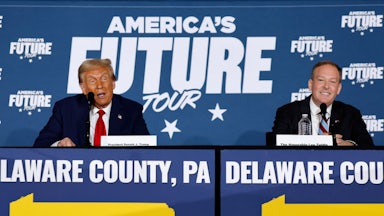It seems hard to believe now, but environmentalism was popular and largely uncontroversial during the 1970s—even among Republicans. While Richard Nixon was a rabid cultural warrior and hippie-puncher, fomenting social division on issues like race, crime, drugs, homosexuality, the Vietnam War, and much else, he also championed Earth Day and the Endangered Species Act; the Environmental Protection Agency was a creation of the Nixon administration. Nixon and many of his contemporary Republicans rightly viewed the environment as a mainstream cause that could bring people together to protect our shared home. When Nixon signed the Endangered Species Act, he said, “Nothing is more precious or worthy of preservation than the rich array of animal life with which our country has been blessed.”
James Watt, as Ronald Reagan’s secretary of the Interior, helped to change all that. (Watt died last month at 85, and his passing was only widely reported last week.) Some of Watt’s specific arguments and beliefs—and most of his policy efforts—failed to catch on, but much of his rhetoric, as well as his legacy of anti-environmentalist culture war, endures. We have Watt to thank for the fact that Republicans today view fossil fuels as an American institution, and for our utter lack of national consensus on climate change and environmental protection.
James Watt had been an Interior undersecretary to Nixon, but seemed to have completely rejected that administration’s environmental commitments by the time Reagan appointed him to head the department in 1981. During his time out of Washington, Watt became a leader of a growing, lavishly funded anti-environmental movement. In 1977, he helped establish the Mountain States Legal Foundation and became its founding president. The conservative organization was supported with money from beer mogul Joseph Coors Sr., and strove to protect property rights and advance the interests of the oil, timber, development, and mineral industries. In 1978, three years before he took office, in a speech to the Conservation Foundation in Dallas, Watt called environmentalists “the greatest threat to the ecology of the West,” and said they were unconcerned about “the quality of life for mankind.”
Watt brought a rabid anti-government and faux-populist ethos to the office of the Interior. In stark contrast to the sensible environmental policies of his Republican predecessors, Watt’s policy enthusiasms included drilling, clear-cutting, despoiling public lands, and shredding environmental regulations. He cut funding for endangered species protection—a direct strike at Nixonian conservation. “We will mine more, drill more, cut more timber,” he said when he took office.
During his tenure, Watt quintupled leasing area for coal mining and bragged about leasing a billion acres of coastal waters for drilling (thankfully, most of it wasn’t used). He stymied efforts to control air pollution in California’s Yosemite Valley. These kinds of policies have been normalized by subsequent Republican Interior secretaries—Scott Pruitt and Ryan Zinke, under Trump, followed a similar playbook—but were so shocking in the early 1980s that Watt became unusually famous for a cabinet secretary. For its October 1982 issue, Mad Magazine ran a cover story, “Watt? We Worry.” A comedian joked at the time that Watt’s idea of communing with nature was “a cookout in a strip mine.”
An evangelical Christian at a time when this was still a novelty identity in mainstream politics, Watt seemed to upend the environmental movement’s emphasis on saving the planet for “our children and grandchildren.” In a Congressional hearing on his (mostly failed) plan to ease restrictions on the use of millions of acres of public land, he said, “I do not know how many future generations we can count on until the Lord returns.” Watt was a dispensationalist, an evangelical strain with a strong emphasis on the Second Coming of Jesus and the Rapture. Such statements were shocking for a politician at the time, but hardly seem out of the ordinary now. In retrospect, bizarre Bible-thumping rhetoric wasn’t Watt’s most important influence on his ideas—or his legacy.
More than evangelical Christianity, Watt’s environmentalism was shaped by the Sagebrush Rebellion of the ’70s, an ideological movement in the Western states rejecting federal environmental regulation, especially on land use. That movement had some grassroots appeal but was also lavishly funded by conservative businessmen. Inspired by this movement, Watt brought a populist framing of anti-environmentalism to national politics, presenting himself as a “concerned Westerner,” opposing environmentalists as “elite groups” trying to “lock away public lands and resources for their own special use.” (He had a tendency to liken all strong government regulations to Nazism.) Again, these statements were in stark opposition to the sensible environmentalism of Republicans past—but sound all-too-familiar to voters today faced with the likes of Lauren Boebert and other Western, MAGA-style Republican politicians. Watt’s characterization of liberal environmentalists as “elites” opposed to popular interests has been such an effective right-wing narrative it’s hard to remember a time when it wasn’t around.
Addressing the annual coal convention of the American Mining Congress in 1981, Watt described environmental organizations as “special interest groups” whose ideas were “outside most people’s thinking on environmental issues.” As Zephaniah Fleetwood, a graduate student in history at the University of California, Davis, wrote in a 2021 history master’s thesis on Watt, he sought “to portray himself and his policies as popular as opposed to the elitist policies of environmentalists and the Eastern political establishment.” Watt once joked privately that his rhetoric was not to speak of Republicans vs Democrats but “liberals and Americans.”
For all his fiery rhetoric, Watt wasn’t exactly successful—and some of his public proclamations were downright embarrassing. Most of his efforts to do environmental damage were blocked by Congress. In 1983, he tried to ban rock bands from a Fourth of July concert on the National Mall, claiming they would attract the “wrong element” and instead arranging for Wayne Newton to provide “patriotic, family-based entertainment.” The fact that the Beach Boys had recently played at the event fueled national mockery of Watt; he later admitted he didn’t even know who the Beach Boys were—a remarkably out-of-touch statement for the early ’80s. The kerfuffle cemented Watt’s national reputation as a weirdo and, as one prominent AM talk show host put it, “a nerd.” His downfall came not with any of his policies, nor with his impolitic decision to attack America’s favorite pop music, but with an insensitive joke about a coal advisory panel that mortified the president. When a Senate resolution calling for his resignation appeared likely to pass, Watt quit his post.
It’s harder to laugh at Watt now. His culture war and populist rhetoric are why some men blow toxic smoke out of their trucks as a political statement, and how gas stoves have become more sacred to conservatives than fetuses. It’s why Americans see red meat consumption as synonymous with patriotism. It’s why the United States has been obstinately, obsessively committed to oil and gas use more than 30 years after the alarm bells were first sounded on climate change.
What’s especially pernicious about Watt’s kind of environmental culture war is that conservatives are much better at it than the left. That’s why, even though he was an uncool joke of a person, he was a success at what he was trying to do: Liberals have never managed to demonize the fossil fuel industry as successfully as Watt demonized environmentalists. That’s how some of Watt’s once-crazy policy leanings have become mainstream, along with his faux-populist style. Joe Biden is not a rock music-hating square, but he has continued James Watt’s policy of freely dispensing leases to oil and gas companies to drill in our wilderness.
Many Americans no longer remember James Watt. That’s hardly a tragedy. But it’s time for Watt’s legacy of culture war and extremism to die along with his memory.






